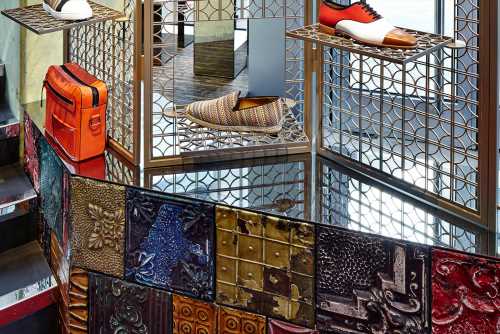MILAN — No fashion brand would deny the value of providing customers with an in-store experience.
“It takes only a few seconds to be pleased by what you see in a store or, on the contrary, be dissatisfied and choose to leave. It’s a thin line to walk,” contended Alessandro Maria Ferreri, chief executive officer and owner of The Style Gate consulting firm.
The consultancy has just been tapped as adviser to Princess Astrid von Liechtenstein, founder of Italy-based Mattec. The leading provider of interiors for a number of luxury brands’ stores — ranging from Off-White, Christian Louboutin and Missoni to Vivienne Westwood, Nancy Gonzales and Acqua di Parma — aims to make sure that there’s only one option: to stay and shop.
Also president of interior design for pharmacies firm Th.Kohl, von Liechtenstein founded Mattec in 2014. “I wanted to combine my sensibility for luxury and passion for fashion and retail,” she explained.
Turning the ideas and blueprints of designers and architects into reality is “a testament to our Italian artisans, everything is made by hand,” she said. Indeed, von Liechtenstein proudly touted throughout the interview with Ferreri how Mattec waves the flag for made in Italy production. Partnering with Vicenza-native Cristian Matteazzi, with three manufacturing plants in the nearby Valpolicella area, all steps are completed locally.

Related Gallery
Molly Goddard RTW Fall 2021
“Made in Italy design, know-how and craftsmanship continue to have such standing and power in the world. I’ve invested so much in this project, combining my German, concrete attitude with that touch of Italian inventiveness,” she said with a smile.
Mattec in 2018 also began creating interiors for luxury hotels Marriott, Hyatt and Hilton. Throughout the pandemic, von Liechtenstein has seen remarkable growth in interior design for the home as Mattec has been tasked with redecorating private homes, too.
Von Liechtenstein confessed “great ambitions” and a strong desire to grow Mattec significantly. For this reason, she admitted she hired The Style Gate to share the decision-making. “I felt I needed someone close to help in this difficult and complicated moment, someone who can tell me if this is the right direction, to do some brainstorming with. We both aim for the highest quality, and Alessandro has a deep understanding of the luxury product, but he has also built an experience in branding and merchandising, supply chain and communication. In addition, he has an incredible network of connections,” she explained.
For his part, Ferreri believes Mattec has “a really incredible potential, there is an art in shop fitting. Not only does luxury need a container that is up to the standard of what is contained. It must be a discreet container, without overshadowing the product, but rather emphasizing it. The shop concept is even more key for the consumer’s experiential journey.”
Alessandro Maria Ferreri and Princess Astrid von Liechtenstein courtesy image
Ferreri said that not only have brands raised their budgets to improve their store concepts, but they are increasingly looking at differentiating the units depending on the location, the city and the country. Von Liechtenstein predicted pop-up stores will increasingly be important to fashion brands and key to the future of retail.
“We work to keep the retail channel alive, it’s a real stronghold, compared to online, for example, where you can’t touch, smell or see all the details that go into a store,” said Ferreri.
Von Liechtenstein believes that, post-COVID-19, “there will be an even greater hunger for IRL experiences, feeding a growing desire to enter into a beautiful store and be assisted. We’ve been stalled for a year, but now we want to be together, we are social animals.”
With offices in New York, Vicenza, Paris and Barcelona, 180 employees and fulfilling more than 500 projects with highly individualized processes, Mattec’s stable of project managers work side-by-side with designers and the company provides not only design, prototyping, engineering and manufacturing but also control over logistics, transportation, deliveries, assembly and installation operations anywhere in the world.
Inside the Vivienne Westwood boutique in Milan. Piero Cruciatti / LaPresse
“Everything is possible and we’ve never had to turn down a project — and I’m a businesswoman, I can’t say ‘no,’” said von Liechtenstein, smiling. From wooden floors and wrought iron work to terra-cotta vases, metal displays and marble slates, even galvanic treatments, everything is done in-house or through a selected web of nearby artisans. “They are actually artists,” she enthused. “Their ability to cut and then match the veins of marble or wood as in a puzzle, as if in a single piece, is unique,” echoed Ferreri.
“I bridge two creative realities, helping creativity to go arm-in-arm with execution,” said Ferreri. “There is so much research and refinement in details that a customer may not even notice, but they add a sense of pleasure and beauty that makes the difference. A customer may not even realize she is sitting on a damask pouf, but her senses are tickled by that detail.”
Ferreri, who was named by Forbes as one of the 100 most influential Italian CEOs last year, said he is perfecting the structure of the organization, creating a method, avoiding bottle necks and increasing the attention to sustainability to further reduce waste, re-evaluating skills and promoting the internal academy. “Good taste trickles down from the princess to everyone in the company,” he mused. He said that just as Valentino’s creative director Pierpaolo Piccioli is shining a spotlight on the brand’s seamstresses, Mattec should “put the company’s craftsmanship at the forefront. The artisans are the ones that create the dream and we want to emphasize their work so that they feel proud of their craft.”
The Missoni boutique in Bal Harbour, Miami. courtesy image
Source: Read Full Article



